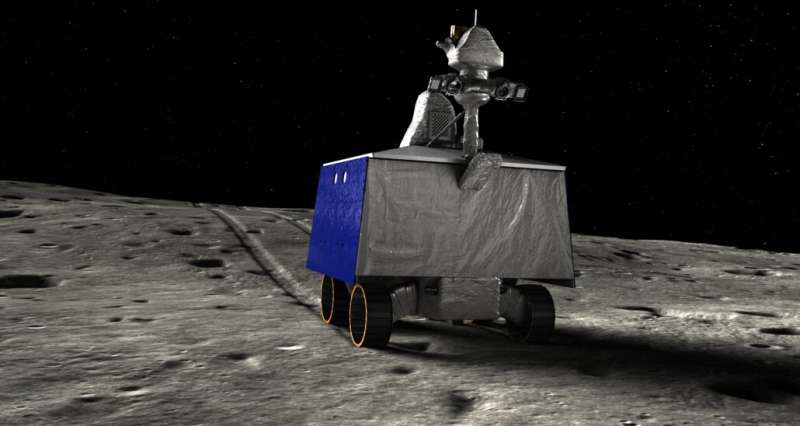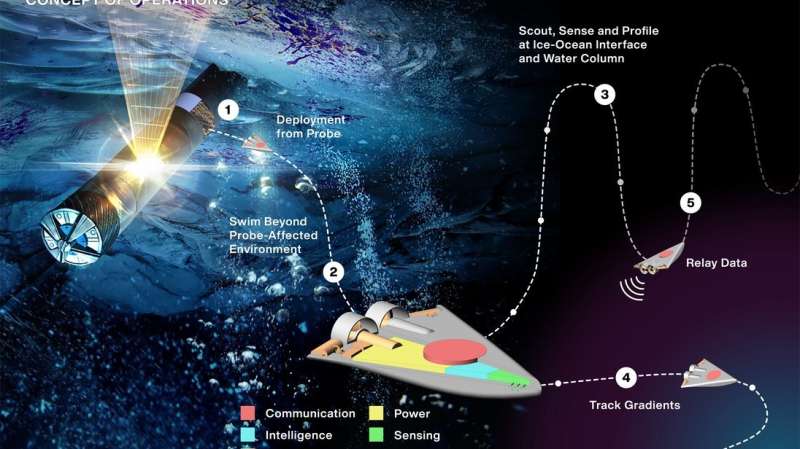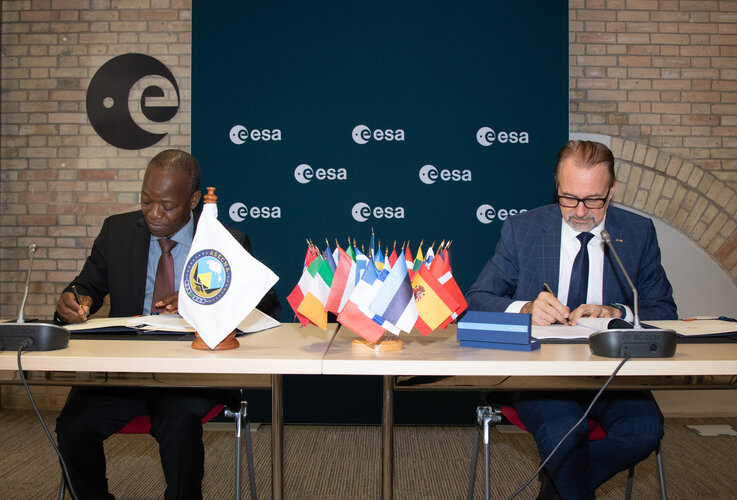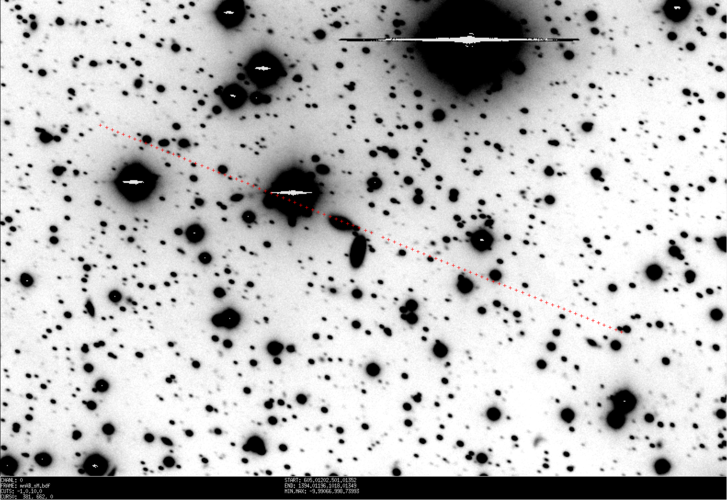
Copernical Team
NASA mission aims to study ice and water on the moon's surface

In the fall of 2023, a U.S. rover will land at the south pole of the moon. Its mission: to explore the water ice that scientists know lurks within the lunar shadows, and which they believe could help sustain humans who may one day explore the moon or use it as a launching pad for more distant space exploration.
NASA recently selected Kevin Lewis, an associate professor in the Krieger School's Department of Earth and Planetary Sciences who has also worked on missions on Mars, as a co-investigator of the mission. Using part of the rover's navigational system, he plans to explore the moon's subsurface geology from his office in Olin Hall.
"I have been on other rover missions, but on Mars, so I'm a little bit new to the moon," Lewis said. "We're going to see into shadows that have never seen the sun, let alone been seen by humans. So it could be a very different type of surface than we've seen in other photos of the surface of the moon."
Drier than a desert
Swarm of tiny swimming robots could look for life on distant worlds

Someday, a swarm of cellphone-size robots could whisk through the water beneath the miles-thick icy shell of Jupiter's moon Europa or Saturn's moon Enceladus, looking for signs of alien life.
EGNOS technology for Africa – ESA signs deal with ASECNA

European technology that allows satellite navigation signals to safely guide aircraft down for landing in the majority of Europe’s airports will now be put to use across Africa and the Indian Ocean. ASECNA, the Agency for Air Navigation Safety in Africa and Madagascar, and ESA today signed an agreement to deploy a Satellite-based Augmentation System (SBAS) across a service region of more than 16.5 million sq. km, one and a half times the size of Europe’s coverage area.
NASA, Rocket Lab launch orbiter to help pave way for astronauts' return to moon
 NASA's CAPSTONE mission spacecraft lifted off into space Tuesday morning on a mission to orbit the moon, moving scientists closer to returning astronauts.
The unmanned lunar orbiter took off on top of a Rocket Lab booster from New Zealand's Mahia Peninsula. The mission was originally set for Monday but was delayed to make a final systems check.
The Cislunar Autonomous Positioning
NASA's CAPSTONE mission spacecraft lifted off into space Tuesday morning on a mission to orbit the moon, moving scientists closer to returning astronauts.
The unmanned lunar orbiter took off on top of a Rocket Lab booster from New Zealand's Mahia Peninsula. The mission was originally set for Monday but was delayed to make a final systems check.
The Cislunar Autonomous Positioning Tough new robots will aim to think and act for themselves on Earth and beyond
 A new generation of smart robots is being developed at The University of Manchester as part of an ambitious R and D programme to help the UK maintain its leadership in automatation technologies,
These new AI-powered machines will be designed to think and act for themselves in some of the most hazardous and toughest places on Earth - and beyond. These robots will be challenged to carry out
A new generation of smart robots is being developed at The University of Manchester as part of an ambitious R and D programme to help the UK maintain its leadership in automatation technologies,
These new AI-powered machines will be designed to think and act for themselves in some of the most hazardous and toughest places on Earth - and beyond. These robots will be challenged to carry out Contract secures design for ESA's FORUM satellite
 ESA has awarded a contract worth 160 million euro to Airbus in the UK to build the Earth Explorer FORUM satellite. This exciting new mission will yield unique insight into the planet's radiation budget and how it is controlled - thereby filling in a critical missing piece of the climate jigsaw.
Short for Far-infrared Outgoing Radiation Understanding and Monitoring, FORUM is ESA's ninth Ear
ESA has awarded a contract worth 160 million euro to Airbus in the UK to build the Earth Explorer FORUM satellite. This exciting new mission will yield unique insight into the planet's radiation budget and how it is controlled - thereby filling in a critical missing piece of the climate jigsaw.
Short for Far-infrared Outgoing Radiation Understanding and Monitoring, FORUM is ESA's ninth Ear Impact in 2052 ruled out as ESA counts down to Asteroid Day

One ESA: an interactive journey around ESA sites!

We are a huge organisation of 5000+ people operating at nine different locations. How do we work together to achieve our goals and fly our missions?
MDA provides Global Fishing Watch access to Radarsat-2 archive to help combat illegal fishing
 MDA Ltd. (TSX:MDA), a leading provider of advanced technology and services to the rapidly expanding global space industry, announced at the 2022 UN Ocean Conference a major new contribution to international efforts to monitor, track and intercept illegal, unreported and unregulated (IUU) fishing activities using satellite technology.
MDA is providing Global Fishing Watch (GFW) - an interna
MDA Ltd. (TSX:MDA), a leading provider of advanced technology and services to the rapidly expanding global space industry, announced at the 2022 UN Ocean Conference a major new contribution to international efforts to monitor, track and intercept illegal, unreported and unregulated (IUU) fishing activities using satellite technology.
MDA is providing Global Fishing Watch (GFW) - an interna Terran Orbital Developed CAPSTONE Heads to the Moon
 Terran Orbital Corporation (NYSE: LLAP), a global leader in satellite solutions, primarily serving the United States and Allied aerospace and defense industries, has announced the successful launch of the CAPSTONE satellite. The Terran Orbital designed and built Cislunar Autonomous Positioning System Technology Operations and Navigation Experiment, otherwise known as CAPSTONE, launched this morn
Terran Orbital Corporation (NYSE: LLAP), a global leader in satellite solutions, primarily serving the United States and Allied aerospace and defense industries, has announced the successful launch of the CAPSTONE satellite. The Terran Orbital designed and built Cislunar Autonomous Positioning System Technology Operations and Navigation Experiment, otherwise known as CAPSTONE, launched this morn 